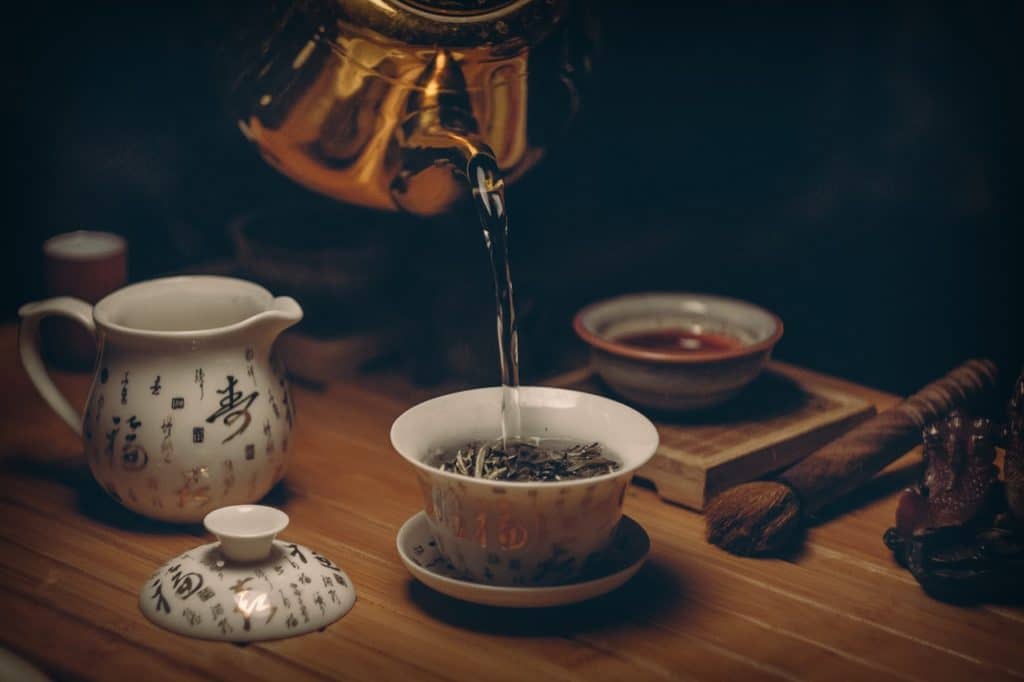The statistics show that a hot cup of tea is the most popular drink around the world, excluding well, you know, water, but that doesn’t really count. In the UK 37% of respondents to a survey asking “how many cups of tea you drink per day” 69% appeared to have at least 1 cup. 37% said they had 2 or 3 cups per day.
In reality we don’t really need statistics to know how popular tea is in the UK, as there’s someone making a cup of brew in offices up and down the country, rain sleet or snow. But why?
Besides just loving the taste and the fact we can all sweeten it to our liking, we know that tea has many properties that work for our bodies. Tea has a similar caffeine profile to coffee, yet not as much caffeine content, and also provides that light nudge in alertness we want to get our day started.
But while we know how it helps us in the morning, it does raise an interesting question: why do so many of us drink it at night? IS tea bad before bedtime? Could it even help us get to sleep?

The short answer is that, the act of putting together a cup of tea itself is as much a part of the calming part as the ingredients can be themselves.
There is something to be said for the placebo effect as well: when we think something is designed to help us our bodies can actually produce the desired reaction.
In fact, part of the reason herbal teas and green teas have become so popular in recent years, is because of the boom in self-care and personal well-being becoming a billion dollar industry. The growth of these industries have led many to substitute regular tea for these brews considering their much better profile as a health drink, combined with the fact that the process of making the drink remains intact.
Drinking tea before bed is somewhat of an enigma. The main reason we question whether or not we should drink tea before sleeping is because of the caffeine content, regardless of other health benefits or otherwise, we’re all pretty certain that the effects of caffeine past 2pm are well-documented. From jitters and difficulty sleeping, there’s enough reason to tell us we shouldn’t be drinking it right before bed.
So which teas are they and what makes them good for bedtime drinking? Below is a list of the 5 tea drinks that have zero caffeine and even have their own individual benefits which make them a perfect replacement for night time drinking.
Valerian Root Tea

Origin: Mediterranean
Type: Root
Brew time for full effect: 5 minutes
Pros: powerful alternative to sleeping pills
Cons: addictive properties bitter taste, can take weeks of use to fully kick in (compounding effect)
We’ve covered valerian root on this blog on more than one occasion in different capacities as it’s a popular choice – it is widely reported to help sufferers of insomnia.
It has recorded use as a sedative stretching back to medieval times. Besides that, the name valerian derives from the Latin verb “valere” meaning “strong” which is a good sign.
Although this is often taken as a supplement in the form of capsules by those who have trouble sleeping, the option to brew I as a tea will naturally make it even more appealing to tea lovers everywhere.
As with most herbal teas, it is known to be rich in antioxidants including hesperidin and linarin.
One thing to note with this tea is that valerian root is known to have addictive properties and even have some interference with other medications – so it is recommended you get professional advice before committing.
When not to take:
Some criticisms come from the “bitter taste” – but this is normally directed at the supplement form rather than the tea.
Chamomile Tea

Origin: Mediterranean
Type: daisy-like flowers of the Asteraceae plant family
Brew time for full effect: 10 minutes
Pros: Also effective for “upset stomach”
Cons: Potential to induce an allergic reaction
Now depending on your views on Valerian, you may opt for something that doesn’t raise any of your suspicions in the form of its contentious addictive properties, and even the lesser concern of the not-so-amazing taste.
For that reason chamomile poses as a solid alternative, and in any case it is quite possibly the most popular herbal tea worldwide, with over a reported 1 million cups made per day. Its enduring popularity may well be why more so than valerian, it is seen as the go-to as a tea sleeping aid. Similarly to the aforementioned, it has been in use for centuries as a sleep remedy as well as a supplement to ward off stress and anxiety.
One of the known active antioxidants found in chamomile flower is Apegenin – studies have shown that Apegenin itself binds to receptors in the brain that 1. Decrease anxiety, and 2. Initiate sleep.
Many studies have successfully shown that chamomile lives up to its colloquial name of a “mild tranquilizer” – but despite this, evidence is not treated as conclusive. For example, one study in which rats were given chamomile, against another supposed sleep-inducer (passiflora), and there was a notable decrease in sleep-onset while taking chamomile.
When not to take:
It’s suggested by professionals that chamomile should not be taken by pregnant women or those undergoing surgery as it has a significant blood-thinning effect
Lavender Tea

Brew time for full effect: 5 minutes
Origin: Mediterranean
Type: Small purple budded flower
Pros: Also effective for anxiety sufferers, for some, only the scent is needed to induce sleep
Cons: less conclusive than valerian or chamomile, potential bitter taste when steeped longer than 5 minutes
Lavender tea makes the list due to is popularity more so than the previous two options.
It seems as though lavender is a tale of two stories when it comes to its value as a night time tea drink, or as a sleep aid in general.
There are many studies which can link the ingestion of lavender (in some form) to a smoother ride to the castle in the air (I really wanted to use that one), but whether or not that effect is realised in tea form is left to speculation. In one such study, over the course of 10 weeks a group receiving Silexan (lavender oil product) rather than the placebo, were observed to have more restorative and better quality sleep.
There is also evidence to show that lavender tea has a more pronounced effect on women than men.
However, this is the limit in regards to any evidence sleep quality is affected by lavender. However, it does seem that the anti-anxiety properties found in lavender can lead in to a better overall sleep experience.
Green Tea
Brew time for full effect: 1-3 minutes
Origin: East Asia
Type: Camellia sinensis leaves and buds
Pros: linked to faster weight loss, widely available
Cons: There is the possibility that it can negatively interact chemotherapy drugs
Unbeknownst to many (myself included not too long ago), (decaffeinated) Green Tea and Herbal Tea are not the same thing. They are two very distinct groups, although they are more similar than either of the two are to regular caffeinated hot beverages.
Green tea is known for its many antioxidants, and some research has even found it to have more useful antioxidants than fruits and vegetables.
One of the widely espoused properties of decaf green tea is the presence of the amino acid L-theanine. There has been significant research that links l-theanine to improved relaxation and drowsiness. At 200mg, L-theanine was shown to reduce the resting heart rate in one study, and in one 2011 study, the effects of l-theanine on sleep were again seen when after a 6 week period, a group of young boys (8-12 years old) receiving 100mg doses were recorded as having “longer more restful” sleep.
Other observations for green tea (with l-theanine)
Better immunity to a range of infections
Linked to better blood pressure control
Sinusitis relief
Special Mentions
Chaga Tea
While a little less-known, chaga tea is a good alternative to coffee for those caffeine lovers as the taste resembles the earthy taste of a black coffee, with zero % of the caffeine content.
Key ingredient: mycelium from birch trees
Good for: Upset stomach antioxidants
Linked to: linked to “immunity”, extract linked to fighting cancer, and lowering cholesterol
Passionflower Tea
This is a tea which is known among users to calm the stomach and mind.
Good for: anxiety, before surgery, managing obsessive thoughts
Linked to: Short term improvement in quality sleep
Lemon Balm Tea
Good for: indigestion, mint-flavour lovers, insomnia, combining with valerian root
Linked to: interacting with GABA receptors which activate to induce sleep
Are They Honestly Better Than Black Tea Or Coffee?
But are they much better than regular tea or even coffee for that matter? We’ll have a look at that question a bit later on in the article for now we’ll look at the case for teas before bedtime.
That question is not as straightforward. I say that because there are just so many conflicting reports on the health benefits, or detractors of caffeinated drinks such as tea and coffee. In moderation both are considered fine, and even beneficial.
What’s interesting is you can easily find research supporting drinking tea/caffeine before bed time, almost as easily as you can find evidence to stop drinking these drinks by 2pm in the afternoon.
Truthfully, it’s up to the user – it matters how these drinks make you feel, to some degree, as long as everything is in a safe quantities.
A Grain of Salt
There is also an argument that suggests you should stop all liquids before sleep, especially teas. Firstly as you’ve seen earlier in this article, none of the studies you’ll find around the web on sleep practices claim to be conclusive evidence. There are too many individual differences between us for one outcome to fit all.





